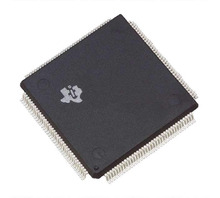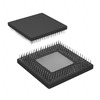Manufacturer Part Number
TMS320C32PCMA40
Manufacturer
Texas Instruments
Introduction
The TMS320C32PCMA40 is a member of Texas Instruments' TMS320C3x series, a line of high-performance, floating-point digital signal processors.
Product Features and Performance
High-performance floating-point capabilities
40MHz clock rate for fast processing speeds
Serial port interface for communication
External non-volatile memory support
25kB on-chip RAM for data storage
Operates at a core and I/O voltage of 5.00V
Capable of functioning in temperatures ranging from -40°C to 125°C
Product Advantages
Precision floating-point processing suitable for advanced signal processing tasks
High clock speed ensures rapid execution of DSP algorithms
Robust temperature range makes it suitable for use in harsh environments
Support for external memory allows for flexible system design
Key Technical Parameters
Clock Rate: 40MHz
On-Chip RAM: 2.25kB
Voltage I/O: 5.00V
Voltage Core: 5.00V
Operating Temperature Range: -40°C ~ 125°C
Interface: Serial Port
Quality and Safety Features
Manufactured by Texas Instruments, a leader in semiconductor technology
Built to meet high quality and safety standards for DSP applications
Compatibility
Compatible with external non-volatile memory for program storage
Serial port for interfacing with other components or devices
Application Areas
Telecommunications
Digital audio processing
Industrial control systems
High-performance computing tasks
Product Lifecycle
Obsolete status, indicating it is no longer being produced
Information on replacements or upgrades may be available through Texas Instruments for ongoing or future projects
Several Key Reasons to Choose This Product
Exceptional floating-point performance ideal for demanding signal processing applications
High clock rate to expedite data processing and task execution
Designed for durability and reliability in extreme conditions
Backed by Texas Instruments' reputation for quality in semiconductor manufacturing
Comprehensive support for interfacing and external memory integration, allowing for flexible system designs




 TMS320C31PQL80Texas Instruments
TMS320C31PQL80Texas Instruments TMS320C31PQL40Texas InstrumentsIC 40 MHZ DSP 132-BQFP
TMS320C31PQL40Texas InstrumentsIC 40 MHZ DSP 132-BQFP TMS320C50PGEA57Texas InstrumentsIC 40 MHZ DSP 144-LQFP
TMS320C50PGEA57Texas InstrumentsIC 40 MHZ DSP 144-LQFP TMS320C44GFW60
TMS320C44GFW60